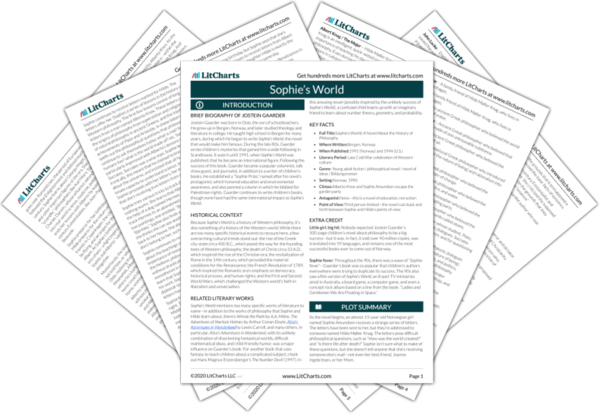Summary
Analysis
Sophie gets back to her house and tells Mom that she’s been visiting Alberto. Mom tells Sophie she checked the phonebook and couldn’t find anyone by that name in town. To reassure her mother, Sophie shows her the video of Athens that Alberto gave her. Mom notes that Alberto looks a lot like the Major who used to live in the cabin, whose name was Albert Knag or Knox.
Sophie isn’t the only one who’s having a hard time telling Alberto Knox and Albert Knag apart: Sophie’s Mom confuses them, too. We know that Sophie is “like” Hilde, and Alberto is “like” Albert. But what is the nature of their relationship? Are they two different versions of the same Platonic form? Two different sets of people in two different worlds?
Themes
Two weeks go by. Sophie goes to Alberto’s apartment across town. Outside, she finds another note wishing Hilde a happy birthday. In the note, Hilde’s father promises her that the “moment of truth” is near at hand, and adds that this moment has something to do with Berkeley.
Once again Sophie’s philosophical education is explicitly tied to the real life mysteries she’s trying to solve. She must get to the philosopher Berkeley (whose portrait we saw in the major’s cabin) in order to learn the truth.
Themes
We cut ahead to June 14. Hermes shows up at Sophie’s house and leads her toward Alberto’s apartment once again. Suddenly, Sophie hears a voice, wishing her a happy birthday. She wonders if Hermes is speaking, then dismisses this idea as impossible. Hermes leads Sophie all the way to the apartment.
Sophie’s interactions with Hilde and Albert Knag become increasingly direct, and her world grows increasingly more fantastical.
Themes
Inside, Sophie finds Alberto. Sophie explains some of the odd events that have happened to her lately, but Alberto insists that she’ll have to wait to find out about them. In the mean time, he’ll teach her about Locke and other philosophers of the time, including Berkeley and Hume.
Alberto deliberately teases Sophie (and us) by promising to explain Albert Knag and instead launching into an explanation of Locke and Hume. The secret of Albert Knag, we can tell, must be earned bystudying philosophy.
Themes
Get the entire Sophie’s World LitChart as a printable PDF.

In the 17th century, the English philosophers were known as empiricists. They believed in the importance of listening to one’s senses and basing all rational conclusions on observation. This school of philosophy stands in marked contrast to the rationalist tradition of Spinoza and Descartes—philosophers who trusted their reason and distrusted sensory data.
As time goes on, philosophy seems to divide along national lines—for example, the continental philosophers of the 17th century were rationalists, while the U.K. philosophers tended to be empiricists. This is both a sign of the rise of the nation-state (a country with its own unique culture and philosophical sub-traditions) and perhaps also a sign of the way that philosophy “adapts” to different environments.
Themes
One important empiricist was John Locke (1632-1704). Locke tried to answer two questions—where we get our ideas from, and whether we can rely on our senses. Locke believed that the mind was born a “tabula rasa,” a blank slate—i.e., when we’re born, we don’t have any ideas or theories of the world. Only observation and experience can fill the mind with ideas—in short, sense comes before reason. But Locke didn’t believe that the mind’s only function was to absorb experiences. He believed that the mind has the ability to interpret and classify sensations, and to reflect on experience.
Locke is especially interested in the process of education: i.e., how the mind goes from blank slatestatus to a state of intelligence. While Locke’s ideas are important, they’re often considered naïve and simplistic compared to the ideas of Kant, let alone the theories of modern psychology and neuroscience.
Themes
Locke tried to answer his question—whether we can trust our senses—by studying the relationship between a sensation and an idea. Locke believed that the only true knowledge is that which is based in some kind of sensation. But some sensations are more “true” than others. For example, we can agree that qualities like size, number, and magnitude are universal—everyone perceives them the same way. But there are also qualities like color, temperature, etc., that are different for nearly everyone. So while all knowledge has to derive from sensation, it’s important to distinguish between different kinds of sensation—the objective and the subjective.
Locke begins to make a distinction between different kinds of qualities and observations. The implication of this is familiar for a historian of philosophy; namely, that perception and reality aren’t necessarily the same thing. Locke’s attention to perception suggestsis reminiscent of Rene Descartes.
Themes
Locke, Alberto continues, wasn’t as different from Descartes as he’s sometimes said to be. He did think that humans have an innate ability to believe in God—an idea that contrasts with his emphasis on sensation. Locke was also a noted champion of women’s rights. Finally, Locke was an important theorist of political systems. He wanted a government to be divided into different branches: a legislative branch, a judiciary, and an executive. By separating government into parts, he believed, the people would have more power, and more say in their own lives and their own happiness.
Alberto quickly summarizes Locke’s political philosophy and feminism, even though in the United States these aspects of his thinking are usually given a lot more attention than his epistemology (especially because Locke’s writings are often considered an inspiration for the American Revolution). Perhaps because Sophie’s World is a Norwegian book, it mostly skips over this information.
Themes












